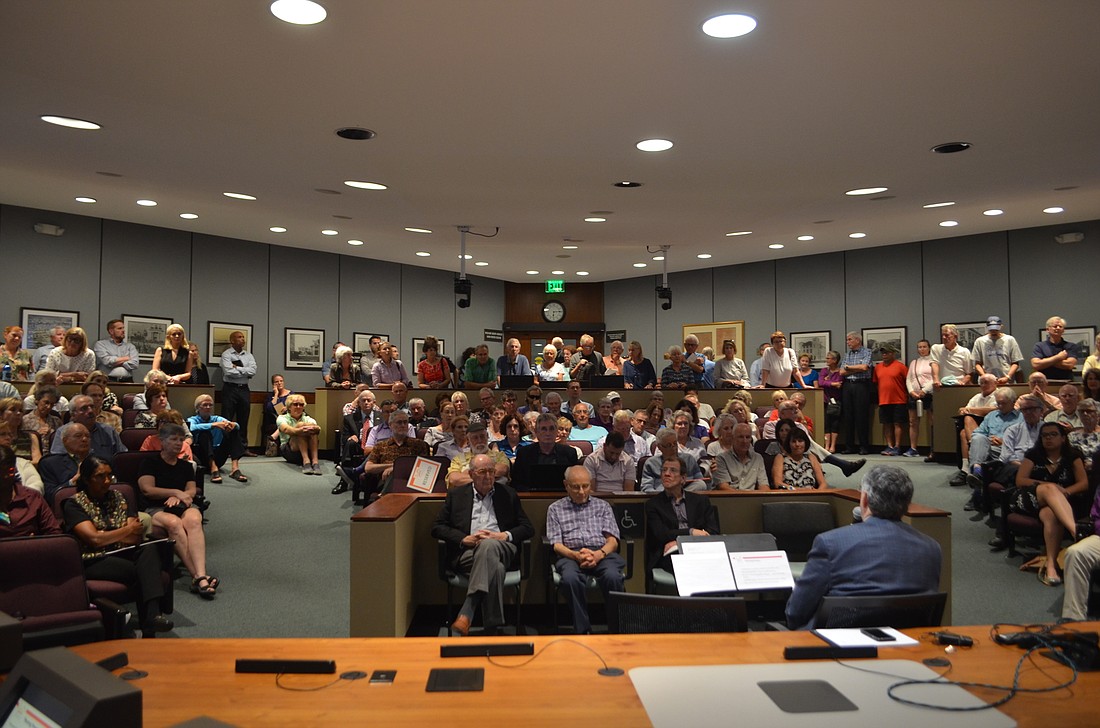- July 26, 2024
-
-
Loading

Loading

A standing-room-only crowd filled the commission chambers at City Hall on Tuesday night to discuss the Sarasota Orchestra’s desire to build a new venue on a portion of Payne Park, with most in attendance strongly criticizing the proposal.
In February, the orchestra met with the City Commission to announce its vision for a concert hall in the northwest corner of the Park. The orchestra said the site was selected after a lengthy internal search process, and the organization framed the concept as one that carried the potential for significant community benefits.
But speakers at the meeting were skeptical about that notion, adamant the orchestra should not build on parkland and encouraged the arts nonprofit to search elsewhere.
“I’m from New York,” said Laurel Park resident Kelly Franklin, whose neighborhood is adjacent to Payne Park. “We love Central Park, and we love Lincoln Center. But if someone thought they could move Lincoln Center into Central Park, I would call it the height of chutzpah.”
The orchestra first publicly shared its intent to pursue a new home last year, when officials announced plans to move away from the bayfront but remain within the city limits. Orchestra President and CEO Joseph McKenna said several key criteria have guided the search process. McKenna said the orchestra wanted a site that would allow a project to move quickly, that carried favorable zoning and that would enable the orchestra to capitalize on existing infrastructure.
Although the orchestra has shared conceptual renderings of its favored configuration for the new venue, McKenna said the organization is still in the early stages of refining its vision. The orchestra said the initial proposal was produced in a vacuum, without city or community input, and that meetings like Tuesday's would help shape any final plans.
“It was done as a what-if,” said Matt Clear, a consultant on the project and principal at HKS Architects, regarding the conceptual proposal. “It was an idea we put out there. Is there opportunity for massaging it? Absolutely.”
The audience at the workshop raised a list of issues for the orchestra to address. A sizable contingent of critics said they used the Payne Park Tennis Center, which would be displaced if the orchestra proceeded with its favored site. Although the orchestra said it would relocate and improve any affected amenities, several speakers said they felt the tennis center was an afterthought in the proposal.
Sami Leigh Scott, a tennis player who organizes matches at Payne Park, has already begun circulating a petition opposing the orchestra’s proposal. She spoke glowingly about the Payne Park Tennis Center, calling it a draw for players from across the region. Before the orchestra announced its plans, she was hopeful the tennis center could be expanded. If the orchestra’s proposal went through, she was worried any expansion would be off the table.
Scott and others were also concerned about the quality of any relocated courts, taking offense at the notion the orchestra could dictate where the tennis facility should go.
“These people showed no interest in us as tennis players,” Scott said. “This is our home, and they can only see myopic dreams of how it’s going to benefit them.”
Other speakers at the meeting were concerned about the potential loss of green space in a public park. The orchestra said its vision would affect about seven acres of a 39-acre city-owned property. Critics said the city’s acceptance of the underlying land in the 1920s included an agreement to use the land for a park, playground or other “kindred uses.”
At the February City Commission workshop, City Attorney Robert Fournier said his preliminary impression was that a concert hall could meet that requirement, though he said he needed to do more research. Opponents of the proposal said a music venue was out of character.
“I think it’s conceivable that a vision like what you have could be realized and still maintain the park, but I don’t believe what you’ve presented does that,” Laurel Park resident Kate Lowman said. “You’ve said it maintains existing amenities, but the amenity you’re forgetting is green space.”
Not all in attendance were critical of the plans. At least two tennis players encouraged the rest of the audience to be more open-minded to the possibility of a workable solution, suggesting the tennis courts could be relocated and expanded in a different portion of the park. Another speaker encouraged all parties to continue exploring the proposal, particularly because it sought to use the nearby county parking facility rather than build a new parking structure.
“The orchestra needs to be in the heart of the city,” Henry Kahwaty said. “We need green spaces in the heart of the city. We don’t need more parking garages.”
After the meeting, McKenna said the orchestra would use the input gathered Tuesday to inform its future decisions regarding community engagement and the process for refining its vision. Although he didn’t share specifics about the precise next steps the orchestra might take, he said the organization was committed to working collaboratively.
Despite the criticism, McKenna called the workshop a valuable step in the orchestra’s quest to find a new home.
“We have presented a bold vision, and that bold vision is generating discussion and reaction,” McKenna said. “That’s not uncommon. Bold visions do that.”